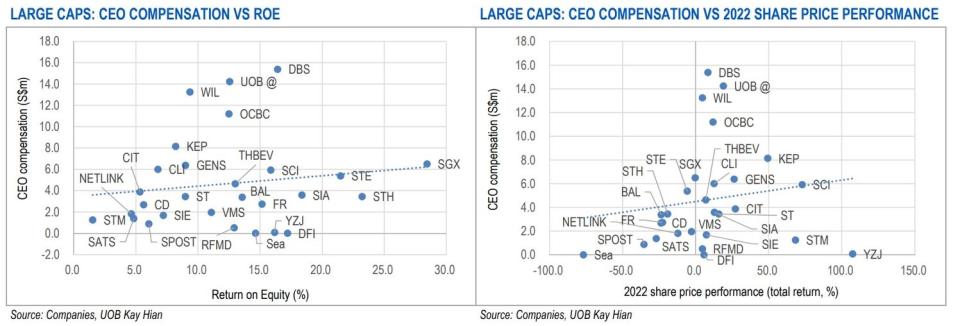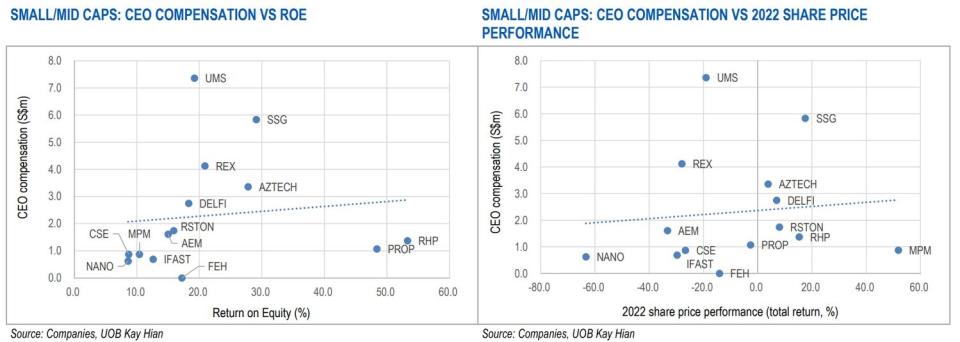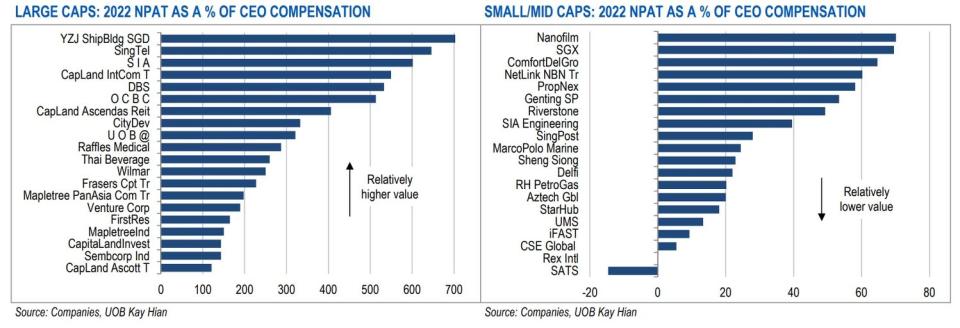UMS and Rex’s CEOs most overpaid in 2022 relative to their share price performances: UOB Kay Hian

Companies that got the most value out of their CEOs were YZJ, Singtel and SIA.
Singapore Exchange (SGX)-listed companies were generally fair in paying their CEOs and their board of directors in 2022, with some CEOs generating more value than the rest, notes UOB Kay Hian analyst Adrian Loh and the Singapore research team.
“We have charted Singapore companies’ CEO compensation in 2022 vs their respective return on equity (ROE) and share price performance for that year,” says Loh in his June 22 report.
“While both showed positive correlations, it was notable that on a relative basis, compensation for CEOs of large-cap companies correlated more to share price performance vs small/mid-cap companies which showed the least correlation between CEO compensation and share price performance,” he adds.
One way of determining whether a CEO was fairly paid was to look at the company’s net profit after tax (NPAT) for the FY2022 as a multiple of the CEO’s compensation.
“Simplistically, this tries to answer the question of whether a CEO has added value to their company and if this is reflected in their pay,” says Loh.
Based on this, the companies that got the most value out of their CEOs were Yangzijiang Shipbuilding (YZJ), Singapore Telecommunications (Singtel) and Singapore Airlines C6l (SIA).
Large-cap companies that recorded ROEs of over 15% in FY2022 such as SGX, Starhub, Singapore Technologies Engineering (ST Engineering), SIA and YZJ also appear to have paid their CEOs fairly.
In the small- and mid-cap space, RH Petrogas T13 and PropNex, which had FY2022 ROEs of 53% and 48% respectively, also seem to have paid their CEOs fairly.
Regarding the CEOs’ salaries compared to the companies’ share price performances, Loh notes that it was fair to say that the CEOs at Seatrium, Sembcorp Industries U96 and Keppel Corporation Bn4 were “well-justified”.
“For the small/mid-caps, Marco Polo Marine 5ly was the standout with a share price gain of 52% in 2022 versus CEO Sean Lee’s pay of [around] $750,000,” says Loh.
YZJ’s CEO, Ren Letian, was the lowest paid on an absolute basis with a compensation of $78,000 for the FY2022. Ren’s pay was also significantly lower than the average CEO pay of $3.6 million within the stocks under UOB Kay Hian’s coverage.
Notably, YZJ’s FY2022 NPAT was over 7,000 times higher than its CEO’s pay, although YZJ’s CEO received $8.3 million in dividends from the company over the same period.
“We also highlight that YZJ’s top three management (excluding CEO) was paid less than $0.4 million in total, while the total compensation of its board of directors was less than $0.3 million,” says Loh.
On the other end, the most overpaid CEOs relative to their companies’ share price performances in 2022 were from UMS and Rex.
UMS’s CEO, Andy Luong, received a remuneration of $7.4 million for the year while Rex’s CEO, Mans Lidgren, drew an annual salary of $4.1 million even though their share prices fell by 19% and 28% respectively. That said, UMS’s NPAT for the FY2022 grew by 85% y-o-y while Rex’s FY2022 fell by 99.5% y-o-y.
In comparison, Sheng Siong’s CEO, Lim Hock Chee, drew a pay of $5.8 million, higher than that of Rex’s CEO, although the supermarket group’s share price rose by 18% in 2022 with an ROE of 29.1%, nine to 10 percentage points higher than that of UMS’s and Rex’s.
“We also note that Rex’s board is one of the highest paid at $5.1 million, which attracted the attention of a corporate governance expert at the National University of Singapore who questioned its payment of performance bonuses to its non-executive directors,” says Loh.
Temasek-linked companies’ CEOs fairly paid
Seven of the top 20 highest-paid CEOs in UOB Kay Hian’s universe of coverage were from Temasek-linked companies, notes the analyst. DBS’s Piyush Gupta was the highest paid at $15.4 million followed by Keppel’s Loh Chin Hua at $8.1 million and CapitaLand Investment’s (CLI) Lee Chee Koon at $6.0 million.
However, Loh notes that DBS had the highest ROE within the financials sector while both Keppel and CLI demonstrated “material share price performance” in 2022, up 49% and 13% and easily outperforming the benchmark Straits Times Index (STI).
Meanwhile, Loh also flagged a few companies that have either not disclosed their respective CEOs’ compensation or provided broad guidance that renders it “meaningless”. Some of the companies mentioned are DFI Retail Group D01 and Food Empire.
“From a governance perspective, this could raise questions from the market about their governance standards, especially for DFI which has the second-highest paid board of directors in our coverage universe at just over $11 million in 2022 (Sheng Siong at $17.9 million had the highest paid board). For Food Empire, it has stated that it will start to disclose its CEO’s compensation from FY2024 onwards,” says Loh. The SGX RegCo, on Jan 11, said that it would require its listed issuers to disclose the exact amount and breakdown of the salaries paid to companies’ directors and CEOs in their annual reports. The new rule will take effect for annual reports prepared for the financial years ending on or after Dec 31, 2024.
To Loh, perceptions of fair pay may vary with the concept of fairness itself being subjective.
“Ultimately, the goal is to strike a balance between attracting and retaining top talent while ensuring that CEO compensation is reasonable, justifiable, and aligned with the long-term success of the organisation,” he writes.
“Ways in which a company can achieve a level of fairness is to benchmark CEO pay to industry peers and similar-sized companies, and putting in place performance-based incentives (e.g. financial metrics such as revenue growth, profitability, and stock price, or non-financial measures like market share, customer satisfaction, and employee engagement),” he adds. “In general, we find that most Singaporean listed companies adhere to such standards, with disclosure lacking in some.”
In addition, the company's board of directors play a crucial role in determining the CEO’s compensation as it represents shareholders' interests.
“They establish a remuneration committee (RC) to review and approve executive pay packages as well as directors’ fees, ensuring alignment with company goals and shareholder interests. However, in a recent isolated case in Singapore, a small-cap oil company’s board allowed for performance bonuses for its non-executive directors which raised the issue of corporate governance – in this particular instance the key failure is a conflict of interest as it was the RC members who awarded themselves such performance bonuses,” notes Loh.
The analyst’s top picks within the Singapore market are CLI, Keppel, Mapletree Logistics Trust M44u (MLT), Lendlease Global Commercial REIT Jyeu (LREIT), Oversea-Chinese Banking Corporation (OCBC), SATS, Sea Limited, Seatrium, Sembcorp, Singtel, Wilmar and YZJ.



See Also:
Click here to stay updated with the Latest Business & Investment News in Singapore
Knee jerk sell-offs for Sembcorp and Keppel ‘overdone’ and presents opportunity to accumulate: DBS
PhillipCapital re-initiates 'reduce' on SIA with TP of $6.80
Analysts keep 'buy' on ThaiBev in anticipation of a consumption recovery; RHB lowers TP to 87 cents
Get in-depth insights from our expert contributors, and dive into financial and economic trends

 Yahoo Finance
Yahoo Finance 